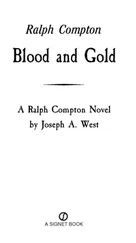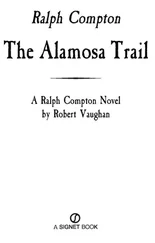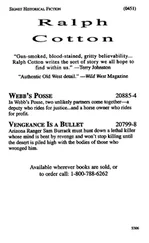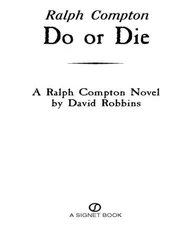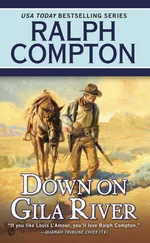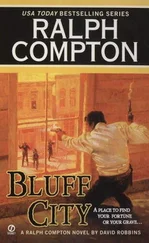Ralph Compton - West of the Law
Здесь есть возможность читать онлайн «Ralph Compton - West of the Law» весь текст электронной книги совершенно бесплатно (целиком полную версию без сокращений). В некоторых случаях можно слушать аудио, скачать через торрент в формате fb2 и присутствует краткое содержание. Год выпуска: 2008, ISBN: 2008, Издательство: Thorndike Press, Жанр: Старинная литература, на английском языке. Описание произведения, (предисловие) а так же отзывы посетителей доступны на портале библиотеки ЛибКат.
- Название:West of the Law
- Автор:
- Издательство:Thorndike Press
- Жанр:
- Год:2008
- ISBN:9781410409225
- Рейтинг книги:4 / 5. Голосов: 1
-
Избранное:Добавить в избранное
- Отзывы:
-
Ваша оценка:
- 80
- 1
- 2
- 3
- 4
- 5
West of the Law: краткое содержание, описание и аннотация
Предлагаем к чтению аннотацию, описание, краткое содержание или предисловие (зависит от того, что написал сам автор книги «West of the Law»). Если вы не нашли необходимую информацию о книге — напишите в комментариях, мы постараемся отыскать её.
West of the Law — читать онлайн бесплатно полную книгу (весь текст) целиком
Ниже представлен текст книги, разбитый по страницам. Система сохранения места последней прочитанной страницы, позволяет с удобством читать онлайн бесплатно книгу «West of the Law», без необходимости каждый раз заново искать на чём Вы остановились. Поставьте закладку, и сможете в любой момент перейти на страницу, на которой закончили чтение.
Интервал:
Закладка:
McBride shook his head and Leggett asked, ‘‘No?’’ then shrugged and poured a generous dollop into his own cup. ‘‘The beefsteak is for your eye, you know.’’
‘‘I don’t think I want to sit here holding a chunk of beef to my face,’’ McBride said.
‘‘Afraid these men will laugh at you? Trust me, after what you did to the late, unlamented Jim Nolan, they won’t.’’ Leggett picked up the steak. ‘‘Now, here, hold that to your eye. It will help with the swelling.’’
McBride looked around the restaurant, then held the steak against his eye. ‘‘Thank you,’’ he said.
‘‘No trouble at all, my boy.’’
‘‘You still haven’t told me why you’re here.’’
‘‘Here? Why, to drink coffee. Later you and I will take a little stroll. I want to show you something.’’
‘‘A bit late for a stroll, isn’t it?’’
Leggett laughed. ‘‘My dear boy, the night is young. It’s not yet midnight and High Hopes is only now hitting its stride.’’
McBride started to rise, leaving the steak on the table. ‘‘Well, Theo, if it’s all the same to you, I believe I’ll pass on the stroll.’’ He grinned. ‘‘And the steak.’’
Leggett’s eyes lifted to the tall man. ‘‘Even if a walk in the dark is the means of saving your life?’’
‘‘I don’t understand,’’ McBride said.
The older man glanced around him. ‘‘Not here. There are too many ears. We’ll talk when we’re outside.’’
Leggett insisted on picking up the bill for McBride’s meal, waving off his protests, then led the way to the door. They walked along the boardwalk until Leggett suddenly stopped under a hanging sign that said, TRAVIS RAMSEY & SON— GUNSMITHS.
As though the sign had stirred something in his mind, the old newspaperman looked directly into McBride’s face and said, ‘‘You can’t beat Hack Burns in a gunfight, you know. He’ll put two or three bullets into you before you even shuck your gun. He’s the best around, maybe the best there is.’’
‘‘I have no intention of meeting Burns in a gun battle,’’ McBride said. ‘‘I’ve got nothing to prove.’’
‘‘He’ll come after you. You’ll have to prove yourself then.’’
McBride felt trapped. The logical thing to do was to catch the first train out of town and go somewhere else. But his stiff-necked pride would not let him run away again. He knew it was a weakness in him, his pride, but he acknowledged it and accepted the limitations it placed on his future actions. And then there was Shannon. His feelings for her also conspired to keep him in High Hopes. There was no escaping that. What she was and what he hoped they might become was holding him in place, like a butterfly pinned to a board.
‘‘Leggett, what do you want from me?’’ McBride asked, his patience with the man wearing thin.
‘‘Soon. Trust me, I’ll tell you soon.’’ Leggett’s shrewd eyes made a study of McBride, from his battered plug hat to the dusty toes of his boots. He tapped the side of his nose with a forefinger. ‘‘Do you know what this is, John? It’s a nose, a nose for news, and right now it’s telling me that you’re a lawman of some kind. A Pinkerton maybe?’’
‘‘I’m not a Pinkerton,’’ McBride said. This old man was no fool.
‘‘But a policeman nevertheless. Or you were. From back East somewhere, Boston or Philadelphia perhaps, but more probably New York.’’
Leggett read McBride’s startled expression and raised his arms above his head. ‘‘Yes! Formosa facies muta commendatio est! For those among us who know no Latin . . . ahem . . . that means, ‘Your handsome face is a silent testimonial.’ ’’
The old man cocked his head to one side, his eyes as bright and inquisitive as a bird’s. ‘‘Look, no notebook, no Faber. Do you want to tell me about it?’’
‘‘I was a police officer, in New York, as you guessed.’’
The boardwalk had cleared as the miners crowded into the saloons and the more respectable sort of townspeople had sought their beds. The moon was riding high in a starless sky, hazy from the rising heat, and out on the rolling plains the coyotes were talking.
Leggett had stirred McBride’s memory. My God, had it been only a few short weeks? It already seemed like a lifetime ago.
Strange, that . . . very strange . . .
The Honey Heaven had been the worst kind of brothel in the Four Corners, one of big Sean Donovan’s lesser establishments where he sent his worn-out whores to be finally worked to death. Only the poorest, most drink-sodden male denizens of the slums that made up Hell’s Kitchen ever went there. The women’s cheeks were pockmarked, their skin mottled, cavernous canker sores all over their toothless gums. Their rented lovers took them in beds crawling with lice, bedbugs, crabs, fleas and other vermin. The men kept their shoes on lest the gibbering rats chew on their toes before they were finished, and the brothel stank of ingrained filth, vomit and disease and the stench of the rank barrels placed outside the doors of the rooms to collect human waste. Among all this ran swarming, naked children with the sly, feral eyes of wild animals, starving, their ribs showing in bodies covered in sores and as white as the bellies of fish.
Here, one dark, rainy night, young, handsome Patrick Donovan came to collect his father’s dues. He flashed his diamonds, pretending not to notice the vile hell around him. As his father had told him many times, ‘‘Money doesn’t stink.’’ Patrick himself believed in that implicitly.
Here too, that night, came Detective Inspector Thomas Byrnes, Detective Sergeant John McBride and a dozen uniformed officers. They had come to raid the place, the shot, stabbed or just plain dead bodies thrown on the sidewalk outside the Honey Heaven most mornings having finally become too much for even the most hardened residents of the Kitchen.
Perhaps when young Patrick Donovan spotted McBride and drew his gun, he believed, as the son of a rich and influential man, the big cop would quail before him and let him go. In this he was wrong. Fatally wrong. McBride, a man who was fond of children and was already incensed at how they were abused at the Honey Heaven, saw Donovan slide the .44 Colt from a shoulder holster and fired, instinctively, without thought. His bullet smacked into the middle of Patrick’s handsome forehead and the young man suddenly looked old and he dropped. Inspector Byrnes later noted, with grim satisfaction, that he had been dead when he hit the ground.
From that moment on, big Sean Donovan, ravaged by grief and possessed by a terrible rage, declared John McBride a marked man, saying that he would bestow riches on the one who brought him his ears.
‘‘Why did you leave the city?’’ Leggett asked.
‘‘I killed a man,’’ McBride told Leggett, the details of that night a lifetime ago lingering like ghosts in his memory.
‘‘And you had to flee New York.’’
‘‘Something like that. The father of the man I killed put a price on my head. I was given a leave of absence and told to head West and lie low.’’
Leggett laughed. ‘‘You just killed a known gunman and you face another at noon tomorrow. John, my boy, you have a strange way of lying low.’’
‘‘That thought has occurred to me,’’ McBride said, irritated at the man for telling him something he already knew.
‘‘Let’s walk,’’ Leggett said.
‘‘I don’t think—’’
‘‘It’s not far.’’
They walked to the edge of town, past a scattered collection of tar-paper shacks and tents, to the spot where the town lights faded and the darkness began. Here the stars were visible and the air smelled cleaner. The moonlight touched the crests of low, rolling hills with a silver sheen, pooling the hollows with purple shadow. There was no wind and nothing moved or made a sound.
Читать дальшеИнтервал:
Закладка:
Похожие книги на «West of the Law»
Представляем Вашему вниманию похожие книги на «West of the Law» списком для выбора. Мы отобрали схожую по названию и смыслу литературу в надежде предоставить читателям больше вариантов отыскать новые, интересные, ещё непрочитанные произведения.
Обсуждение, отзывы о книге «West of the Law» и просто собственные мнения читателей. Оставьте ваши комментарии, напишите, что Вы думаете о произведении, его смысле или главных героях. Укажите что конкретно понравилось, а что нет, и почему Вы так считаете.

